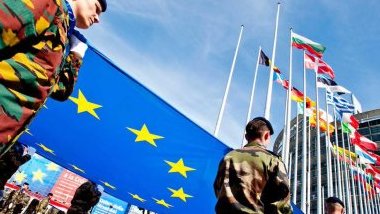The Cybridisation of EU Defence
Cyber Defence has become an important part of protecting European forces during EU-led military operations, and will in the future be a vital part of the EU’s Common Security and Defence Policy (CSDP). Cyberattacks against military installations could have catastrophic effects on military operations. As digitalisation of European armies has started, threats of network centric warfare are increasing and is today referred to the “fifth domain” of warfare alongside air, sea, land and space.
Until now, much of the EU’s actions have been related to training and exercises.
These exercises have allowed the EU to establish its very own cyber defence doctrine, which will ensure effective response from the Union. Moreover, a great effort has been made to establish a coherent chain of command and response across the EU’s institutional system. The new Joint Communication on EU cybersecurity states that increased focus on targeted training and research is necessary; accordingly €25 million has been allocated for Preparatory Action on Defence Research. Cyberdefence is also an important part for the European Defence Industrial Development Programme.
Overall, the EU has started a Cybridisation - which will prepare member states’ military command chains for future challenges.
EU plans aid to prosecute hackers and support member states
The EU aims at stepping up its cooperation in cybersecurity. Euractiv reports that the EU will support its member states to find and prosecute hackers outside the Union.
The agreement between the member states’ foreign affairs ministers came after two large scale cyberattacks earlier this year. The new regulation will give The European Union Agency for Network and Information Security (ENISA) more power and create a certification programme that will try to take measures to secure technology products.
Member states can ask for triggering different responses if attacked, this could for example be sanctions or other preventative acts. Researchers have stated that this is “a new level of maturity” in the Union’s cybersecurity policies and further states the Union’s commitment to cybersecurity.
This month’s interview: Cybersecurity partnership: Europe lacks “strategic” tech muscle
In an interview with Euractiv Luigi Rebuffi, leader of the EU public-private partnership on cybersecurity, stated that his organization will, most likely, exceed the €1.8 billion investment it pledged to reach within four years. Rebuffi also stated that attacks against democratic states increased the political awareness of the cyberattacks threat, but that the EU lacks strategic technological muscles to handle new threats. A new cybersecurity fund supporting SMEs could, however, stop this.
Macron’s speech
In a landmark speech delivered on September 26th at La Sorbonne University, President Emmanuel Macron has outlined several objectives with regards to European defence cooperation. It is noteworthy that his vision stems less from traditional French ideology, but more from a pragmatic sense of urgency, of a need to be able to act autonomously and to complement, rather than side-line, NATO.
First, he wants the EU to implement existing projects: the European Defence Fund and PESCO.
Second, President Macron made three ambitious proposals: to establish a common intervention force, a common defence budget and a common doctrine for action. Several days after, at the European Council held in Tallinn, Chancellor Angela Merkel seemed to support Macron’s proposals that weren’t linked to Eurozone governance – a tricky subject for her future coalition partners.
Indeed, while the German Green party is traditionally pro-EU, the liberal FDP is more skeptical of Macron’s economic agenda. However, “There are sensible proposals, for example closer integration on defence policy and protecting the EU’s borders”, according to Hermann Otto Solms, a leading FDP figure.
Similarly, while further eurozone integration is perceived as a threat in non-eurozone countries such as Bulgaria, Macron’s proposals on defence are on the contrary most welcome.
Yet, different strategic cultures, geographical positions, and perceived threats, would make these proposals difficult – if not impossible – to implement. In addition, Brexit leaves France as the EU’s top military power: seen from Poland, this is an issue.
ZOOM-IN: CSDP
European Defence Action Plan
By presenting its Defence Action Plan on 30 November 2016, including a proposal for a European Defence Fund, the Commission made a step forwards into the direction of an equilibrated institutional balance in CSDP. Based on Commission President Juncker’s State of Union Speech of 14 September 2016, the Commission proposed this fund based on three financing structures: one for research, one for industrial development and a last one supporting a coordinated procurement policy.
The project is to establish a coordination board composed of the High Representative, the Commission, the Member States, the EDA and representatives from the industry which will supervise these two windows. It represents a step towards joint capabilities having the same standards and therefore rendering cooperation more feasible, also by enhancing the role of different actors working together.
Single command headquarter
During the Council meeting of 6 March 2017, foreign and defence ministers agreed to establish a Military Planning and Conduct Capability within the EU Military Staff which was presented by the press as a common command centre in Brussels. The Military Planning and Conduct Capability will be responsible for the operational planning and conduct of non-executive military missions at the strategic level.






Follow the comments: |
|
